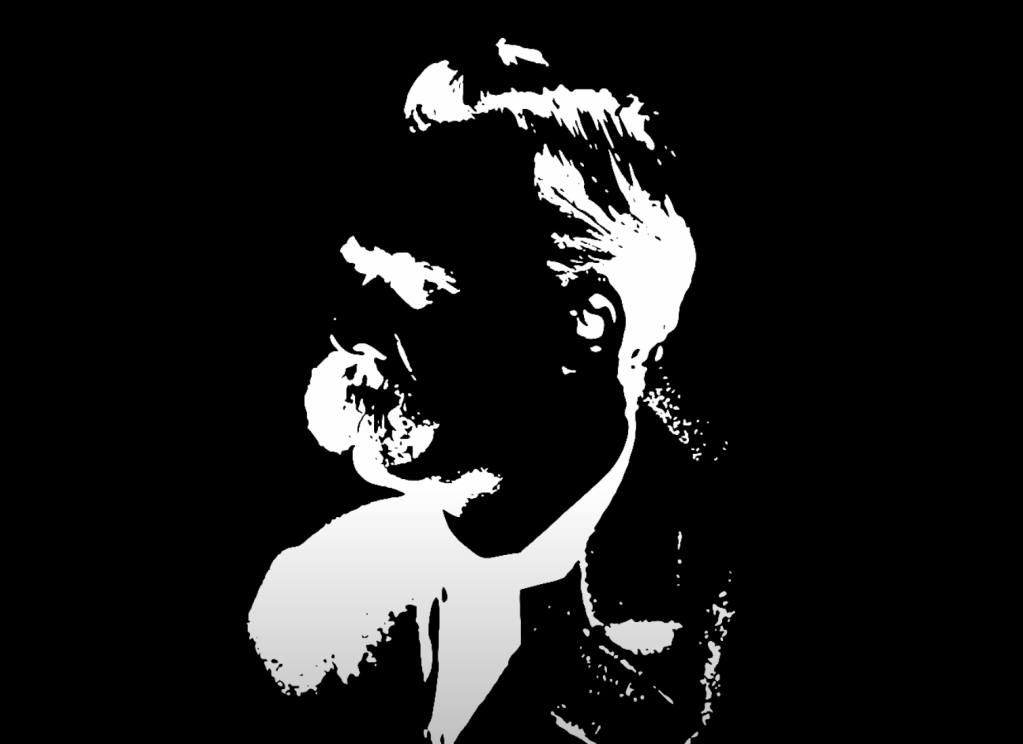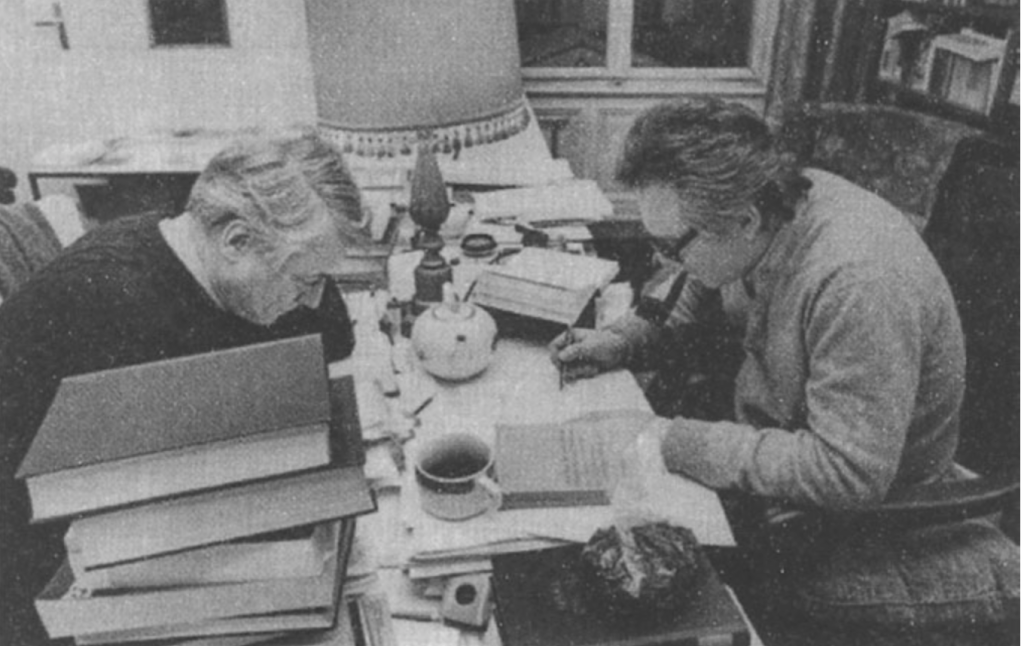Intellectuals used to change their minds, have we forgotten how?
One thing seems clear today, we rarely change our minds on political and theoretical matters. What does it mean to do so, and what are the implications? Lately I’ve been reading intellectual biographies. It’s a good practice and I recommend it. I’d argue it’s just as important as reading the letters and correspondence–the epistolary material–of a thinker. Biographies have their limitations, however. We must avoid reducing a thinker to a psychobiographical portrait as this tends to psychologize the motivations behind their thought (for this tendency see Hölderlin and the Question of the Father or read Otobiographies by Derrida on Nietzsche’s Ecce Homo. These two works somehow sap the profundity of Hölderlin and Nietzsche in ways that are either too clinical as Laplanche does in his psychoanalytic study of Hölderlin, or too psychologistic and reductive as Derrida does in his treatment of Nietzsche’s auto-biography).
Biographies also risk trivializing a thinker’s work which can have the effect of leading us to read their ideas as basically dead concepts, reducible to the time and place they were thought. The biographical portrait of a thinker is essential but we have to be aware of these limitations.
Perhaps the most important thing intellectual biographies elicit are the real social conditions in which a thinker changes their mind. Plato called a shift in thinking “metanoia” or the process in which one takes back a prior position they held. This can come in the form of a conversion, such as with Lukács’s conversion from romantic anti-capitalism to Bolshevism and revolutionary socialism after the revolution in 1917. Or it can come from the other side, a metanoia wherein one’s political perspective and orientation is acknowledged as facing a certain end point.
It’s essential to any development of one’s writing voice or daimon (yes, I wholeheartedly believe in daimons now that I have been writing so much) that we change. Without changing your mind or perspective, your entire political trajectory and orientation will remain muddled. You will regress intellectually in your capacity to develop fresh ideas and you will likely face a crisis of courage over your convictions. Without breaking from stultified paradigms of thinking of social conflict and antagonism you risk getting caught in a loop wherein you have not mustered the fortitude to see the world anew. But in simple terms, you will end up totally captured by the dominant ideologies.
Take Lukács. He changed his mind so much that he even wrote prefaces to his older books where he urged the reader not to take any of it seriously, (see his Preface to the Theory of the Novel in the early 1960s to see what I mean).
A major impediment to intellectual life on the left in our time is centered on the difficulty that we seem to have with moving out of old paradigms and abandoning stultified or problematic perspectives and thinkers. We don’t seem capable of letting go of thinkers that once seized us. Perhaps this is due to the fact that our equivalent of 1917 is 2008 and the Covid pandemic and other capitalist crises, which are by now meta-stabilized events that seem to absorb into a new and slightly worse form of inertia. This might explain why we pre-sort people ideologically based on the affiliations and tastes they have intellectually identified with.
Deleuzians, Foucaultians, Lacanians, Heideggerians, etc. are some common theoretical communities that most of us are familiar with. These communities develop a common practice, they form mini-worldviews. But what is their function? In a positive sense, their function is to contend with and to contribute to defining the philosophical footing of the left. The positive function of a theoretical community is to compel a vision of the impediments to liberation, they function to pose problems and formulate questions that can spur collective action.
If you are a Marxist, it is important that you think hard about a philosophical orientation that can guide your practice. One can very readily retort, (and many do!) that Marxists don’t need philosophy to situate their practice. And to that I would reply that Marxism does not need a philosophical perspective to replace Marxism, but that it rather benefits from the incorporation of philosophical insights, and for that matter so does the wider socialist struggle as such. But let me be clear: I think it is important that any philosophical community should not overwhelm Marxism and massively alter its core tenets. If that is what philosophy promotes, we must be ready to change our minds, especially if we have been ensnared in the philosophers cave.
The most radical philosophical overhauling of Marx and Marxism in our time was initiated by Deleuze and Guattari. Philosophically, this was all situated on a Nietzschean foothold. Philosophically, it was Nietzsche trumping Marx. The magnitude and the extent of this overhauling and damage to Marxism is the topic of my latest essay.
How did this come to be? How did Deleuze and Guattari capture such attention across the contemporary left, and why have so much of the core tenets of their project been overlooked by readers? There are several funny memes about Deleuze reading groups out there. My favorite is the one with the discussion leader holding the members hostage. Deleuze had, after all, written an incredible book on masochism that Lacan praised as the finest written psychoanalytic work he had read in some time. The humor of the meme is found in the way that the difficulty of Deleuze is so immense that it calls for a hostage-like situation in order to master it. Explain Deleuze to me. Don’t dumb it down!! reads another common meme.
I was never a ‘dyed-in-the-wool’ Deleuze person. Not by any stretch. I saw his work as brilliant and I am a Lacanian so it became necessary to understand the ‘renegade’ project that he and Guattari had developed with the Anti-Oedipus series. And so I ended up reading that text three times, twice in a reading group setting. By the third time, I was reading it because I wanted to understand the trajectories of leftism that it gave rise to and that continue to shape the contemporary left. By the third time I had already incorporated a skeptical position and I began to treat the project as flawed. But I did not know why or how. I was always drawn to the way that it seized people, the way it elicited its own profound metanoia. But I also saw how once it drew you in, people had no exit.
All of this is to say that I have just published a new article on Anti-Oedipus, its legacy on today’s left, the core problems that I now find with the series and most importantly perhaps, how even Deleuze himself made a metanoia from the project in the early 1990s upon reflecting on the shortcomings involved with the practice of the anti-oedipal politics he and Guattari had developed.

You can read my new article here, or if you do not have academia.edu you can read a PDF here.




Leave a comment